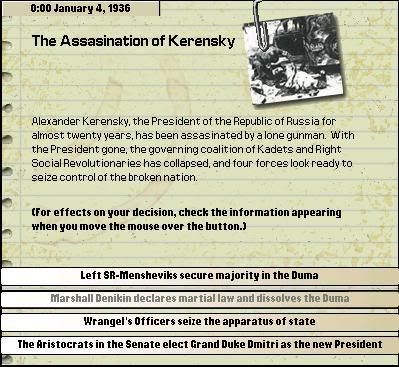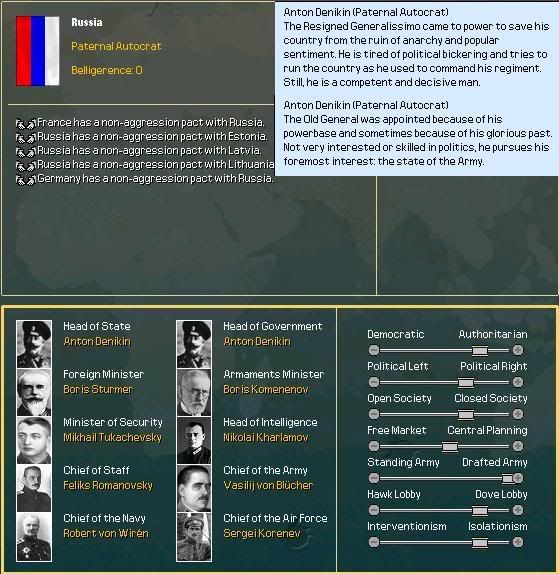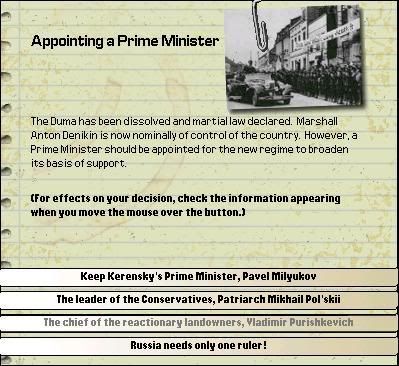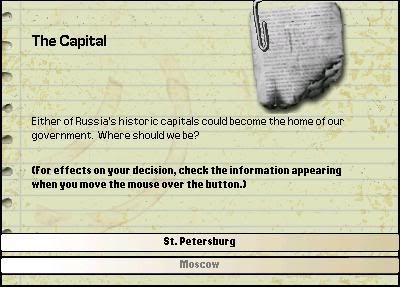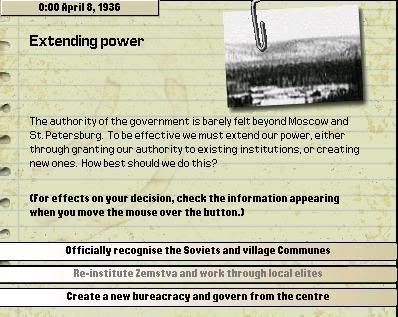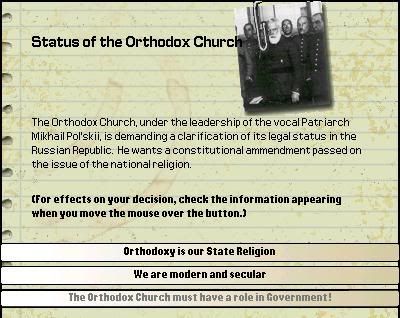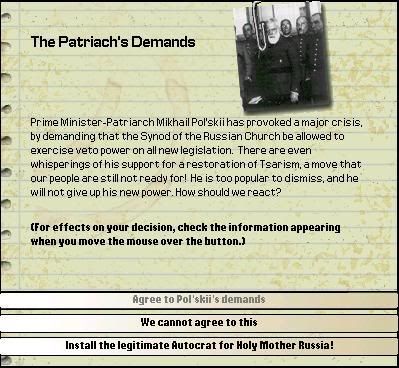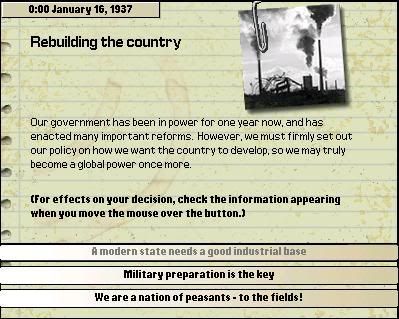Pieces of the Motherland - An Orthodox Russian ATR AAR
. . . but by then, Russian Civil War had strained both Alexander Kerensky's White Russian Alliance and Vladimir Lenin's Bolshevik forces so much that neither side had the power to move against the other. The White Russians had control of most of Siberian Russia and South-East European Russia, but the Red Russians controlled most of European Russia, including the major industrial and transportation hubs. Kerensky became more and more desperate, unable to make a move, and sensing that the long-term trend was in the Red's favor, he made a deal with the new Polish state: if Polish forces came into the war on the side of the Whites, after the war they would gain some Russian territory and promised that the Ukraine would enter the Polish sphere of influence. With Polish help, St. Petersburg and Moscow fell by September 1921. The Russian Republic was proclaimed on October 12, 1921.
By this time what had been the Russian Empire had fragmented into a dozen pieces (see Fig. 1). In the North, Finlad was it's own country; in the Baltic, Estonia, Latvia, and Lithuania had declared their independence, as had Georgia, Armenia, Azerbaijan, and the Don-Kuban Union in the Caucasian region. The Ukraine was a Polish puppet, and Mongolia and Japan both took Russian land, with the Japanese gains becoming the Trans-Amur Republic; both countries held important parts of the Trans-Siberian Railroad. In Central Asia, Kazakhstan, Turkestan, and Tannu Tuva all became independent countries.

Kerensky's helplessness in stopping these countries from breaking away, and refusal to take them back after the Civil War made him many enemies, and his coalition of Right Social Revolutionaries and Kadets was on the verge of falling apart at any time. After his assassination in 1936, four groups fought against each other for power:
Pieces of the Motherland
An Orthodox Russian 'All the Russias' AAR
An Orthodox Russian 'All the Russias' AAR
The following is an exert from Civil War to Unification: A History of Russia, 1917-1953 by J. Ringley:January 4, 1936
Moscow, Russia
"Minister Denikin, we must speak. Do you have time now? It is urgent."
"Why, Sergius, my Patriarch, I always have time for you."
"We have a problem, Anton. It is Kerensky."
"Yes, I know, Kerensky. He has been ruling the country with too light a hand, not asserting his power over the breakaways."
"No, not that, Anton. He is dead."
"Dead? Patriarch, how?"
"A lone gunman. How he died is not important. What is important is that without him, the ruling coalition has effectively collapsed. The Mensheviks are moving to secure the coalition's seats in the Duma, and word is that Wrangel is organizing a coup on whomever the new government is."
"I must take action. Neither the Mensheviks or Wrangel would make suitable leaders for the Motherland. We need a strong leader to bring the Rodina to her rightful place in the world."
"You have the support of Russian Orthodox Church. You have my support, as Sergius I, Patriarch of Moscow and All Russia."
"The army will never support the reds, and Wrangel can only grab ahold of the radical officers. I must take control of Russia, of the Motherland, if for no better reason than to save it from them. Thank you for informing me of this, Sergius. If you will excuse me, I must go. I have much work to do."
. . . but by then, Russian Civil War had strained both Alexander Kerensky's White Russian Alliance and Vladimir Lenin's Bolshevik forces so much that neither side had the power to move against the other. The White Russians had control of most of Siberian Russia and South-East European Russia, but the Red Russians controlled most of European Russia, including the major industrial and transportation hubs. Kerensky became more and more desperate, unable to make a move, and sensing that the long-term trend was in the Red's favor, he made a deal with the new Polish state: if Polish forces came into the war on the side of the Whites, after the war they would gain some Russian territory and promised that the Ukraine would enter the Polish sphere of influence. With Polish help, St. Petersburg and Moscow fell by September 1921. The Russian Republic was proclaimed on October 12, 1921.
By this time what had been the Russian Empire had fragmented into a dozen pieces (see Fig. 1). In the North, Finlad was it's own country; in the Baltic, Estonia, Latvia, and Lithuania had declared their independence, as had Georgia, Armenia, Azerbaijan, and the Don-Kuban Union in the Caucasian region. The Ukraine was a Polish puppet, and Mongolia and Japan both took Russian land, with the Japanese gains becoming the Trans-Amur Republic; both countries held important parts of the Trans-Siberian Railroad. In Central Asia, Kazakhstan, Turkestan, and Tannu Tuva all became independent countries.

Fig. 1
Kerensky's helplessness in stopping these countries from breaking away, and refusal to take them back after the Civil War made him many enemies, and his coalition of Right Social Revolutionaries and Kadets was on the verge of falling apart at any time. After his assassination in 1936, four groups fought against each other for power:
- the leftist Mensheviks, brothers to the extinct Bolsheviks
- the fascist Chief of Security, Baron Wrangel
- the old nobility, and their puppet leader Grand Duke Dmitri Pavlovich
- the Minister of Defence, Anton Ivanovich Denikin, with the support of the army and the Orthodox Church
Last edited:


